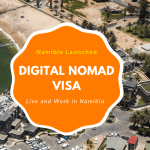What’s New: Croatia to Offer Digital Nomad Visas

Digital nomads wishing to live in Croatia will soon be able to do so, as the country is in the process of introducing a Digital Nomad Visa, which will allow internationals who are engaged in jobs independent of location and time, to work in Croatia.
On 26 August, Croatian Prime Minister Andrej Plenkovic posted on Twitter where he said that Croatia would adjust the Aliens Act to legally regulate the stay of digital nomads.
S nizozemskim poduzetnikom sa splitskom adresom Jan de Jongom o novom Zakonu o strancima kojim će 🇭🇷 postati jedna od prvih zemlja na svijetu koja će zakonski regulirati boravak “digitalnih nomada”. pic.twitter.com/CDRIEl7y5v
— Andrej Plenković (@AndrejPlenkovic) August 26, 2020
Prior to announcing the decision, PM Plenkovic met with Dutch entrepreneur, Jan de Jong who for 14 years now lives in the city of Split, in Croatia.
“[Meeting] with Dutch entrepreneur with a Split address, Jan de Jong, on the new Aliens Act, which will make Croatia one of the first countries in the world to legally regulate the stay of digital nomads,”
the Prime Minister tweeted over a picture of his with entrepreneur Jan de Jong.
Previously, de Jong had sent an open letter to Plenkovic calling on him to establish a visa that would enable internationals to stay in Croatia as digital nomads citing the example of Estonia as one of the first countries in the world to have introduced such a visa.
Despite the Prime Minister’s support, in order for the visa to be finalised, the Alien’s Act amendment will first have to go through parliament and get approved by a majority.
Digital nomads are professionals who choose to work in location-independent roles and explore the world at the same time, rather than permanently basing themselves in one location.
The number of digital nomads has been growing in recent years, thus pushing governments to amend their laws on the stay and work of foreigners. Aside from Estonia, other countries like Bermuda and Barbados have also introduced the same scheme to offer to people who are not constrained to work in a specific location.
According to a study, in the USA alone, 4.8 million independent workers present themselves as digital nomads. While in the UK, 0.03 percent of the job market consists of positions offering remote work.
With more and more countries supporting this kind of work lifestyle, people who have not considered this as a viable option will come to realise its potential allure.
Other than employees, there are, of course, entrepreneurs and business owners that fit into the location independent workers category. And now, with the coronavirus pandemic, this category of workers is likely to grow as employers embrace working remotely and technology that enables this.
Even universities and students are getting in on the act with studies moving online.
The war for talent is going to get even fiercer as companies will be looking at attracting talent worldwide, for team members that are wanting to be location independent.
Expect to now also see more countries enter the arena to offer these Digital Nomad Visas.
These types of remote workers have a little drain on a country's resources and yet contribute vastly to the local economy by spending and adding to tax revenues.
The war for talent is about to get more interesting as companies and countries fight for these prized travellers and it's getting easier to become one.
What do you think of the digital nomad lifestyle? Is it for you? Sound off in the comments below!
- Travel Alert: UK Government Issues New Advice for India and Pakistan - 8 May 2025
- UK May Tighten Visa Rules for Some Nationalities - 7 May 2025
- Romania Off US Visa-Free List - 6 May 2025









